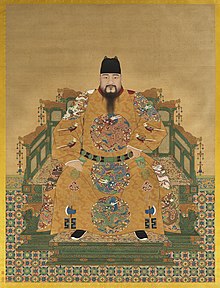Chenghua (Ming Emperor)
Chenghua成化 (born December 9, 1447 , † September 9, 1487 ) birth name: Zhu Jianshen朱 見 深, temple name : Xianzong憲宗, was the eighth Chinese emperor of the Ming dynasty . He ruled China from 1464 to 1487 .
The Chenghua Emperor was the son of the Zhengtong Emperor and Empress Zhou. He was only two years old when his father was abducted by the Mongols in 1449 and remained in Mongolia as a hostage . After his uncle seized power as Emperor Jingtai and placed his father under house arrest , Chenghua also lived in captivity at court for almost seven years. His position as crown prince was transferred from Jingtai to his son. Only after his father had recaptured the dragon throne was Prince Zhu Jianshen reinstated in his old position.
Emperor Chenghua inherited the throne at the age of 17 and was subordinate to a Regency Council of twelve regents, with whose help he led an exemplary government. He reduced taxes, abolished draconian penalties, and reorganized the army more efficiently. But this picture changed at the end of his government. Political power slipped into the hands of the eunuchs , especially the chief eunuch Wang Zhi. Peasant revolts broke out again and again in the empire and were ruthlessly suppressed. Chenghua became increasingly autocratic, and social freedom was severely curtailed by the introduction of a new secret police , the Western Depot ( Xichang ). In contrast to the secret service of the Eastern Depot , this monitored all public activities and speeches. Anyone who noticed this espionage apparatus in the population had to expect charges of high treason . The Western Depot was to remain active and monitor the public throughout the 16th century .
Chenghua expanded the Great Wall of China to better monitor the borders against the Mongols.
The concubine Wan Guifei had a particularly great influence on the emperor, who was naturally weak-willed and indecisive. In this way, the harem lady was able to gain great political power and also grant her serf Liang Fang high offices. Dame Wan got rich on a large scale, sold offices and amassed enormous fortunes. Her own son with the emperor died early, after which she kept the ruler away from other palace ladies. When women did get pregnant every now and then, she killed the mothers and their children. When another concubine was expecting a child from the emperor, Empress Wang stepped in and hid the concubine in her palace. The subsequently born son was well hidden by her. Five years later, when Chenghua expressed how unhappy he was that he had no heir, his empress revealed Prince Zhu Yutang to him, who was then immediately made crown prince. The lady Wan was angry about this ruse and had the boy's mother killed, whereupon Wan fell increasingly out of favor.
Chenghua loved music and theater, he is considered a great master of calligraphy , a talented painter and connoisseur of porcelain art. The Chenghua porcelain is one of the most beautiful porcelain in Chinese art history. The Chenghua Emperor died in 1487 after 23 years on the throne.
literature
- Frederick W. Mote: Imperial China 900–1800. Harvard, Cambridge 2003, ISBN 0-674-44515-5
- Ann Paludan: Chronicle of the Chinese Emperors. Thames & Hudson, London 1998, ISBN 0-500-05090-2
- Denis Twitchett , Frederick W. Mote: The Cambridge History of China. Vol. 7. The Ming Dynasty 1368-1644. Part 1. University Press, Cambridge 1988, ISBN 0-521-24332-7
| predecessor | Office | successor |
|---|---|---|
| Tianshun |
Emperor of China 1464 - 1487 |
Hongzhi |
| personal data | |
|---|---|
| SURNAME | Chenghua |
| ALTERNATIVE NAMES | Zhu Jianshen 朱 見 深 (maiden name); Xianzong 憲宗 (temple name) |
| BRIEF DESCRIPTION | Chinese emperor of the Ming Dynasty |
| DATE OF BIRTH | December 9, 1447 |
| DATE OF DEATH | September 9, 1487 |

